
Patient Info
Dental Implants
Cosmetic Dentistry
General Dentistry
Tooth extractions are quite common among adults, and the prospect of undergoing one can be daunting. When your dentist informs you that a tooth extraction is necessary, it's natural to feel anxious and apprehensive. However, this information also presents an opportunity for you to seek clarity by asking questions about the procedure, aftercare, and recovery process. Gathering all the necessary information beforehand can help alleviate your concerns and prepare you for the upcoming appointment. The most common question about tooth extractions is: How long after a tooth extraction can I eat?
You must be wondering, How long after a tooth extraction can I eat? You can resume eating a few hours after your tooth extraction surgery. However, it's important to wait until the numbing medication wears off, which typically takes a few hours. Once the numbness subsides, you can begin consuming the recommended foods.
The following food can be eaten after tooth extraction.
During the initial 24 hours following tooth extraction surgery, it's best to avoid solid foods that require chewing. Instead, stick to liquids such as milkshakes, applesauce, and smoothies. However, if you prefer solid foods, opt for soft options like pudding and porridge.
It's crucial to avoid using a straw for drinking during this time. While convenient, the suction created by a straw can remove the blood clot in the extraction site, leading to pain, bleeding, and delayed healing.
You can start introducing soft foods into your diet that require minimal chewing. Be careful not to chew near the extraction site to avoid any discomfort or disruption. It's crucial to avoid consuming extremely hot or cold foods during the initial days following the tooth extraction. Hot foods can stimulate blood flow to the extraction site, potentially dislodging the blood clot.
While sticking to a liquid diet is recommended, it's important to refrain from consuming alcohol for at least 48 hours after the surgery, as it can interact with medications and impede the healing process. Additionally, it's advisable to steer clear of smoking, as the chemicals in tobacco can hinder the healing process and prolong recovery.
Refrain from chewing near the extraction site to ensure a smooth recovery. However, you can gradually return to your regular diet after 72 hours. Avoid hot, sticky, spicy, acidic, and crunchy foods until your gum tissue and jawbone have fully healed to prevent any complications.
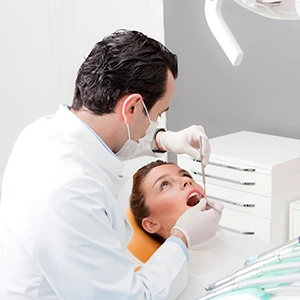
Dentists recommend tooth extractions to eliminate infections or diseases from your mouth, promoting overall oral health. During surgical tooth extraction, the mouth remains moist, creating an environment conducive to bacterial growth. With over 600 species of bacteria present in the mouth, a wet wound becomes susceptible to complications if not managed carefully.
Food restrictions may seem like a minor inconvenience, but they are crucial for ensuring smooth healing after extraction. Adhering to these restrictions is vital to prevent potential complications and promote optimal recovery. Ignoring the dentist's instructions may prolong the healing process and result in additional visits for treatment.
While abstaining from certain foods temporarily may be inconvenient, it is a small sacrifice compared to the benefits of resolving dental issues and achieving a healthy mouth.
Still thinking, "How long after a tooth extraction can I eat?" The timeline for resuming eating after a tooth extraction varies for each individual, depending on factors like healing speed and personal comfort. It's crucial to adhere closely to your dentist's post-extraction instructions to ensure a successful and comfortable recovery. Beginning with soft foods and gradually transitioning to harder ones as you heal will promote optimal recovery and minimize discomfort.
Ready to discuss your dental needs or have questions about tooth extraction recovery? Book an appointment online with Springhill Dental Health Center, Mobile, AL, or call us at (251) 265-7808 for new patients and (251) 343-1521 for all other callers.
You can start eating soft foods after 24 hours, gradually progressing to solid foods as tolerated.
It's best to avoid using straws for the first few days after extraction to prevent dislodging the blood clot.
Some discomfort is normal, but it should gradually improve within a few days. If the pain remains or worsens, consult your dentist.
How long do gums take to recover after tooth extraction? This is a question that many individuals ask after undergoing a dental extraction procedure. Tooth extractions are frequently necessary due to pain and inadequate oral hygiene. According to one study, 37.5% of individuals undergo extractions due to pain. However, there are various other reasons why a tooth may need to be removed, including:
Keep on reading to familiarize yourself with the tooth extraction procedure, healing process, and aftercare tips to facilitate a smoother recovery.
The process of removing teeth can be quite involved and falls into two main categories: simple extractions and surgical extractions. Before we begin, we'll invite you to our office for an examination, including x-rays, to determine the best approach for your extraction.
If the tooth is suitable for a simple extraction, we'll start by numbing the area with a local anesthetic to provide you comfort during the procedure. Although you may feel some pressure, our goal is to minimize any discomfort.
Using specialized tools like forceps, lifters, or elevators, we'll gently loosen the tooth.
We'll carefully remove the tooth using forceps once the tooth is loose enough. Depending on the situation, we may decide to place a stitch to aid in healing and reduce the risk of complications.
A surgical procedure becomes necessary when a tooth is situated below the gum line, or its structure is too fragile for a straightforward extraction. Surgical removal is a more intricate process, and it requires the use of local anesthesia to ensure your comfort.
After numbing the area, we'll make an incision near your gum line to gain access to the underlying bone and tooth.
Depending on the extent of tooth decay, it may be necessary to extract the tooth in segments. Following the extraction, we'll carefully stitch the gum back together since there will be an empty socket where the tooth once resided.
Blood will fill the tooth's cavity, forming a clot that aids in the healing process. Over the next week or two, you'll need to be mindful of your diet as the gums will be tender, and healing will continue to progress.

The healing process of gums following a tooth extraction is crucial for overall recovery. After the decayed or broken tooth is removed, the extraction site undergoes various stages of healing. However, improper post-operative care during the initial stages can cause complications such as infection or dry socket – a painful condition.
0 - 24 Hours: Immediately after the extraction, a blood clot is formed in the socket where the tooth once was. This clot is vital for protecting the inner gums from bacteria and debris. Ensuring the clot remains intact is crucial during this period to prevent complications like dry sockets. Once the clot is formed, the gums and jawbone can begin healing with a reduced risk of infection.
24 - 48 Hours: Soreness and discomfort are common during the first couple of days post-extraction. Care must be taken to avoid activities that could dislodge the blood clot, such as using straws or consuming certain foods. Any bleeding or swelling experienced should start to diminish by the end of this period.
48 - 72 Hours: Over the next 24 hours following the 48-hour mark, gum healing and regeneration begin to occur, setting the stage for continued recovery.
After 7 to 10 days, new gum tissue will start filling the hole in your gum. If stitches were used to close the hole, they'll begin to dissolve around this time. In cases where dissolving sutures weren't used, we may need to remove them manually.
By this stage, you'll likely find that you can eat most foods without experiencing pain or discomfort. However, the healing process will continue for several weeks. It may take up to a month for the hole left by the extraction to fully heal with new tissue. Larger teeth, such as wisdom teeth or molars, may take even longer to heal completely.
It generally takes about 3 to 4 weeks for full healing to occur after a tooth extraction. During this time, your gums will gradually heal, and any visible indentation in the gum will disappear. You can get back to your normal activities and eating habits within the first one to two weeks following the extraction.
Pain management is a significant concern for most people after a tooth extraction. It's common to experience discomfort for a few days post-extraction, particularly while eating, drinking, or engaging in regular activities.
However, as each day passes, the pain typically lessens. Many individuals find that the discomfort lasts between 3 to 7 days, with decreasing intensity after the third or fourth day. In some cases, the pain may completely disappear.
Please Note: If the pain persists beyond the fifth day after the extraction or becomes severe, it's crucial to contact our office for further evaluation. Experiencing excruciating pain is not typical during the healing process.
Here are some essential tooth extraction aftercare tips to promote healing and minimize discomfort:
The healing timeline for gums after a tooth extraction varies from person to person. While the initial stages of healing occur within the first 24 to 72 hours, complete healing may take several weeks. By following proper aftercare instructions and seeking guidance from your dentist, you can ensure a smooth and successful recovery process.
If you're in need of a tooth extraction or have questions about the healing process, don't hesitate to reach out to Springhill Dental Health Center in Mobile, AL. Book an appointment online today, or call us at (251) 265-7808 for new patients and (251) 343-1521 for all other callers.
The initial stages of healing occur within the first 24 to 72 hours, but complete healing may take several weeks.
Follow your dentist's aftercare instructions, maintain good oral hygiene, avoid smoking, and eat soft foods to minimize discomfort and promote healing.
Some discomfort is normal after a tooth extraction but should gradually improve within a few days. If the pain remains or worsens, contact your dentist for further evaluation.
Why do my other teeth hurt after tooth extraction?" This perplexing question often arises in the minds of individuals who experience discomfort in neighboring teeth following a tooth extraction procedure. While tooth extractions are commonly performed to alleviate pain or resolve dental issues, the occurrence of pain in adjacent teeth can be unexpected and worrisome.
In this blog, we will explore the possible reasons why other teeth may hurt after a tooth extraction, shedding light on common concerns and offering insights into managing post-extraction discomfort.
To understand why my other teeth hurt after tooth extraction, it's important to understand how the extraction process works. When a tooth is extracted, the dentist manipulates the surrounding tissues, such as gums and bone, which can cause minor trauma. Additionally, the neighboring teeth may experience temporary increased pressure as the extraction site heals, which can contribute to discomfort.
There are several factors that can contribute to pain in neighboring teeth after a dental procedure such as a tooth extraction:
After a tooth extraction, the surgical site often becomes inflamed as the body begins the healing process. This inflammation can spread to nearby teeth, causing increased sensitivity and discomfort.
When a tooth is extracted, it can disrupt the alignment of neighboring teeth. This change in bite alignment may lead to temporary discomfort or soreness in nearby teeth as they adapt to the new positioning.
During the extraction procedure, dental instruments may accidentally touch adjacent teeth, resulting in minor irritation or bruising. This irritation can cause brief pain in neighboring teeth.
Existing dental issues, such as infections or damage to nearby teeth, may worsen following a tooth extraction. The stress of the extraction process can exacerbate these conditions, resulting in discomfort in neighboring teeth.

Experiencing discomfort in neighboring teeth following a tooth extraction is common, but it's important to address it promptly for effective healing. Here are some practical steps to manage post-extraction discomfort:
Make sure to carefully follow the aftercare guidelines provided by your dentist. These instructions are crucial for promoting proper healing and managing any pain effectively.
Stick to your dentist's recommendations for gentle brushing and rinsing to keep the extraction site clean and reduce the risk of infection. Keeping your mouth clean is crucial for the healing process.
Consider taking over-the-counter pain medications or using prescribed pain relievers to alleviate discomfort. You can also apply a cold compress to the outside of your jaw to help reduce inflammation and provide relief.
Keep an eye out for any unusual symptoms, such as persistent or worsening pain, excessive bleeding, or signs of infection. If you notice any concerns, don't hesitate to contact your dentist for further evaluation and assistance.
While some degree of discomfort is normal after a tooth extraction, certain symptoms warrant immediate attention from a dental professional. Contact your dentist if you experience:
Wondering Why my other teeth hurt after tooth extraction. Experiencing pain in nearby teeth following a tooth extraction can cause distress. However, understanding the reasons and using effective management methods can alleviate discomfort and aid in healing. Adhering to post-extraction care instructions, keeping up with oral hygiene, and seeking dental guidance when needed empower individuals to confidently navigate the recovery phase, promoting a smoother healing journey.
If you're experiencing discomfort in neighboring teeth after a tooth extraction, don't hesitate to seek professional help. Book an appointment online with Springhill Dental Health Center, Mobile, AL, or call us at (251) 265-7808 for new patients and (251) 343-1521 for all other callers.
Pain in neighboring teeth after tooth extraction can occur due to factors such as inflammation, a shift in bite alignment, irritation from instruments, or pre-existing dental issues.
Discomfort in neighboring teeth typically subsides within a few days to a week after tooth extraction. However, if the pain persists or worsens, it's important to consult a dentist.
To manage discomfort in neighboring teeth, follow your dentist's aftercare instructions, maintain good oral hygiene, use pain relief methods as recommended, and monitor for any signs of complications.
We've all experienced tooth pain at some point, but knowing when it's serious enough to warrant immediate attention can be confusing. "When is Tooth Pain an Emergency?" is a question many of us grapple with when faced with dental discomfort. Whether it's a dull ache or a sharp, stabbing pain, understanding the difference between regular toothaches and urgent situations is crucial.
In this blog, we'll explore the signs and symptoms that indicate a dental emergency and what you can do to alleviate the pain and prevent further complications.
A toothache is a type of pain or discomfort that originates from a tooth or the surrounding gum and jaw area. It varies in intensity, ranging from mild to severe, and may be continuous or intermittent.
Toothaches usually occur when a tooth experiences significant pressure or trauma, often from biting into sharp or hot objects. This pressure or trauma results in pain and irritation in the tooth and jaw area, leading to swelling or exposure to bacteria.
Chewing on hard substances wears down teeth, exposing the root. This exposure can lead to infection or irritation by bacteria, causing swelling and pain around the jaw and teeth.
Inadequate daily brushing allows bacteria to thrive in poorly cleaned areas, exposing teeth and gums to disease-causing bacteria that cause decay and pain.
Impacted teeth can cause intense pain and damage. They can lead to severe damage affecting quality of life and may cause decay and alignment issues. Addressing further damage caused by impacted teeth can help alleviate pain and restore normalcy.
Pain from chipped and broken teeth is common among both children and adults. Beyond affecting oral hygiene and eating habits, many individuals also experience pain and discomfort. Various factors can cause chipped teeth, including impact from a hard surface or a fall.

Dealing with a toothache promptly is crucial to prevent serious damage. But how do you know "when is tooth pain an emergency?"
The CDC advises that you seek help within 24 hours of a dental emergency. Important factors to consider are- the intensity of the pain, how much damage there is, and your overall health.
If you're experiencing severe, throbbing pain for more than 12 hours if your teeth are bleeding, or if you're running a fever or feeling chills, don't wait—see your dentist right away. And if you're unsure what to do in an emergency, reach out to your dentist's office for guidance as soon as possible!
How you handle a dental emergency can greatly affect your treatment's success. Here are some tips:
In a toothache emergency, some may feel inclined to try self-dental treatment. However, this isn't recommended as it can lead to more problems, such as spreading infection and worsening pain. Instead, opt for applying cold water or ice packs on your cheekbones to help reduce swelling in the affected area.
Understanding “When is tooth pain an emergency?” is vital for maintaining oral health. Whether it's persistent throbbing or sudden sharp pain, knowing when to seek professional help can prevent further complications. Don't hesitate to reach out to your dentist if you're experiencing severe tooth pain. Your oral health is too important to ignore.
If you're experiencing tooth pain and suspect it may be an emergency, don't delay seeking professional help. Book an appointment online with Springhill Dental Health Center, Mobile, AL. New patients can call (251) 265-7808, and all others can call (251) 343-1521.
If you're experiencing severe, persistent pain, bleeding, fever, or swelling, it's likely a dental emergency.
It's best not to wait if you're experiencing severe pain or other signs of a dental emergency. Contact your dentist as soon as possible.
If you can't reach your dentist immediately, consider visiting an emergency dental clinic or seeking medical attention if the pain is severe.
When it comes to restoring your natural-looking smile, the type of dentures you choose plays a significant role. "What type of dentures are most natural looking?" is a common question among those seeking to regain their confidence and oral functionality. Today, advancements in dental technology offer various options designed to match the appearance of an individual's natural teeth.
In this blog, we will look into different types of dentures and discuss which ones are renowned for their natural aesthetics.
Before exploring natural-looking dentures, it's essential to understand what dentures are and how they function. Dentures are artificial devices crafted to replace lost teeth and surrounding tissues within the mouth. They come in various forms, including full dentures for complete tooth loss and partial dentures for those with some natural teeth remaining. Dentures restore oral function and enhance facial aesthetics, providing patients with a confident smile.
Types of Dentures Known for Natural Aesthetics are:
Implant-supported dentures offer unparalleled stability and realism. This particular denture is attached to dental implants that are surgically positioned in the jawbone, offering a stable base for the artificial teeth. Implant-supported dentures closely mimic the function and appearance of natural teeth, allowing for comfortable chewing and speaking.
Porcelain dentures are prized for their natural translucency and durability. These dentures closely resemble natural tooth enamel, reflecting light in a manner similar to real teeth. Porcelain dentures are stain-resistant and offer exceptional longevity, making them popular for those seeking natural aesthetics.
Custom acrylic dentures are crafted to match the unique characteristics of each patient's smile. Dentists work closely with dental technicians to make dentures that blend seamlessly with natural teeth, ensuring a harmonious appearance. Custom acrylic dentures offer versatility and aesthetic appeal, catering to individual preferences and lifestyle needs.
When choosing the right type of dentures for your needs, several factors come into play: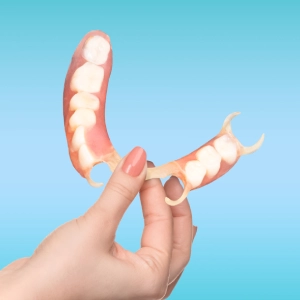
Cost is a significant factor to consider. Conventional complete dentures and partial dentures are usually more budget-friendly compared to implant-supported dentures. Flexible dentures may fall in between in terms of cost. Discuss your budget with a dentist to explore suitable options based on your financial situation.
The state of your oral health is crucial in determining the most appropriate denture option. If you have healthy teeth remaining, partial or implant-supported dentures might be feasible. However, conventional complete dentures may be recommended if you have extensive tooth loss or gum disease.
Implant-supported dentures offer a secure fit and enhanced stability during activities like eating and speaking. They provide the confidence to enjoy a variety of foods without concern. Conversely, conventional full dentures and partial dentures may need occasional adjustments for optimal comfort.
The lifespan of dentures is another crucial consideration. While conventional full dentures and partial dentures may require relining or replacement over time due to changes in your mouth's shape, implant-supported dentures are known for their durability and longevity. Implant-supported dentures can last for several years with proper care and regular dental check-ups.
Here are some tips to enhance the natural look of dentures:
Opt for denture teeth that closely match the natural color of your existing teeth. Your dentist can help you select the shade that best complements your smile.
Natural teeth come in various shapes and sizes. Work with your dentist to choose dentures that mimic the exact shape and size of your original teeth for a more authentic appearance.
Pay attention to the color and texture of the gum portion of your dentures. Natural-looking dentures should have gums that closely resemble the color and texture of natural gum tissue.
Invest in custom-made dentures rather than opting for generic ones. Custom dentures are crafted to fit your mouth precisely and can be tailored to achieve a more natural look.
Maintain your dentures properly by cleaning them regularly and following your dentist's care instructions. Proper maintenance helps prevent discoloration and keeps your dentures looking natural for longer.
Reduce intake of foods and beverages known to stain dentures, like coffee, tea, red wine, and certain berries. Rinse your mouth and clean your dentures after consuming staining substances.
Visit your dentist for regular check-ups and adjustments to ensure that your dentures fit properly and look natural. Professional adjustments can address any changes in fit or appearance over time.
By following these tips, you can enhance the natural look of your dentures and maintain a confident smile.
So, What type of dentures are most natural looking? When it comes to achieving the most natural-looking dentures, several factors come into play, including the material used, the fabrication process, and your dentist's expertise. By considering these factors and discussing your options with your dental provider, you can make an informed decision that enhances both the appearance and function of your smile. Remember, natural-looking dentures restore your confidence and improve your overall quality of life.
Get Natural-Looking Dentures at Springhill Dental Health Center, Mobile, AL! Schedule Your Smile Transformation Today. For new patients, dial (251) 265-7808, while existing patients can reach us at (251) 343-1521. Let's create your confident smile together!
Factors such as material selection, tooth shape and color, gum color and texture, and customization techniques all influence the natural look of dentures.
Implant-supported dentures tend to provide a more natural appearance and greater stability compared to conventional dentures due to their secure fit and support from dental implants.
There are affordable options for natural-looking dentures available, including conventional full dentures, partial dentures, and flexible dentures. Your dentist can help you find the best option based on your budget and preferences.
It's quite a journey – you've finally acquired your gleaming new dentures! Can you sleep with dentures in? That's the burning question many ask after receiving their new set. Initially, it's common to keep them overnight as a soothing bandage aiding gum recovery. But is this practice advisable in the long term? The short answer is NO; leaving dentures in at night might do more harm than good.
Keep reading to find out why! Following these steps doesn't just keep your dentures clean and prevent bacteria from building up; it also gives your gums the break they need.
Dentures are important for restoring your smile after losing natural teeth due to gum disease, tooth decay, or injury. They not only enhance your appearance but also make speaking and eating easier while helping to maintain the appearance of your face. Dentures themselves don't cause oral health problems. However, neglecting your oral health while wearing dentures may lead to issues. Sleeping with your dentures increases the risk of bacteria buildup, which can potentially cause gum disease in the long term.
Sleeping with dentures also increases the likelihood of developing denture stomatitis, an infection caused by a yeast or fungus known as candida. Denture stomatitis results in sore, red, and inflamed gums that may require treatment. If ignored, this condition can result in ill-fitting dentures over time. Some research suggests that older individuals who sleep with their dentures might have a higher chance of developing pneumonia. You can prevent potential health issues by taking out and cleaning your dentures at night.
Initially, you may need to wear your dentures for most of the day, including during sleep, for the first few days. As your mouth becomes used to the dentures, you should refrain from wearing them overnight. Taking them out at night allows your gums to rest, reducing the risk of associated oral health issues.
Throughout the day, you should wear your dentures as usual unless instructed otherwise by your dentist.
Keeping your dentures clean is essential for preventing gum inflammation, infections, and further tooth loss. Cleaning your gums and dentures daily helps eliminate harmful bacteria and maintains oral health.
Treat your dentures with the same care as your natural teeth by cleaning them at least once daily and after meals if necessary. Generally, brush and soak your dentures daily using a non-abrasive denture cleaner, not toothpaste. Overnight, soak them in a denture-cleaning solution. Avoid using bleaching products to clean your dentures, as they can weaken them and cause breakage.
Follow the tips below to care for your dentures at night.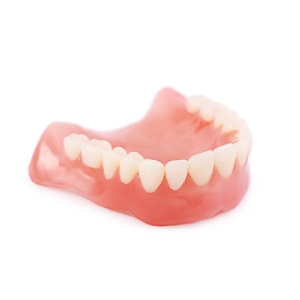
Fill the sink with warm water before removing your dentures for the night. Place a rolled-up towel on the edge of the sink to cushion your dentures in case they fall. Consider laying another towel on the floor if you're concerned about dropping or breaking it, especially on hard surfaces like stone or tile floors.
Rinsing with warm water can help loosen the grip of your denture adhesive, facilitating the removal of your dentures.
Start by taking out your bottom denture, then remove the top one. Different types of dentures may require different removal techniques. Refer to specific instructions for your type of dentures.
Run your dentures under running water to remove any loose food particles.
Use a denture brush or soft regular toothbrush to brush your dentures. Use water, denture paste, or non-abrasive toothpaste, and avoid using regular toothpaste with abrasives.
Gargle with warm salt water and use a clean washcloth to wipe along your gums and the roof of your mouth. Rinse your mouth with warm water again afterward.
If you have partial dentures, you should also brush your natural teeth. Consider using oral rinse for oral freshness and to prevent plaque buildup or bacteria on your gums.
Soak your dentures in a denture cleaning solution or water overnight.
Follow the instructions on the packaging of the denture cleanser. If you have partial dentures, use a cleaning solution designed for partials.
Thoroughly rinse your dentures with water before reinserting them into your mouth.
So, can you sleep with dentures in? While it may seem convenient, leaving dentures in overnight can lead to various issues, including bacterial buildup and discomfort. It's crucial to prioritize proper denture care, which includes removing them at night to allow your gums to rest and prevent potential health problems in the long run.
Enhance Your Oral Health Today! Book Your Appointment at Springhill Dental Health Center, Mobile, AL. For new patients, call (251) 265-7808. For existing patients, call (251) 343-1521 to secure your consultation.
Leaving dentures in while sleeping can lead to bacterial buildup, discomfort, and potential oral health issues.
It is recommended to remove dentures every night to allow your gums to rest and prevent oral health problems.
While it may seem convenient, removing dentures at night is best to maintain optimal oral health and prevent potential complications.
Whitening dentures can significantly enhance the appearance and confidence of individuals who rely on them. Learning how to whiten dentures is essential to maintaining oral hygiene and aesthetics. Whether you're new to denture care or seeking ways to revitalize your smile, understanding the techniques and best practices for whitening dentures is paramount.
This comprehensive guide will explore various methods, tips, and considerations for achieving brighter, more vibrant dentures.
Before diving into the whitening process, it's important to grasp the common causes of denture stains. These stains can result from various factors, including:
Consuming highly pigmented foods and drinks like coffee, tea, red wine, and berries can contribute to denture discoloration over time.
Smoking or chewing tobacco can result in persistent stains and yellowing of dentures.
Improper cleaning techniques or infrequent maintenance can allow plaque and bacteria to accumulate, resulting in discoloration.
As dentures age, they may naturally become dull or discolored due to wear and tear.
There are several methods to whiten Dentures. Some of them are given below:
Specialized denture cleansers are designed to remove stains and debris from dentures effectively. These cleansers typically come in tablet or solution form and should be used as directed.
Make a paste by mixing baking soda with water and softly brushing your dentures using a soft-bristled toothbrush. Baking soda serves as a gentle abrasive, aiding in the removal of surface stains.
Soaking dentures in a diluted hydrogen peroxide solution can help whiten and disinfect them. However, it's essential to rinse thoroughly afterward to remove any residue.
Soaking dentures in a solution of vinegar and water can help remove stubborn stains. Vinegar is a natural cleanser that helps restore the brightness of dentures.
Various over-the-counter denture whitening products are available, including whitening gels, creams, and sprays. These products are specifically formulated to brighten dentures and restore their natural luster.
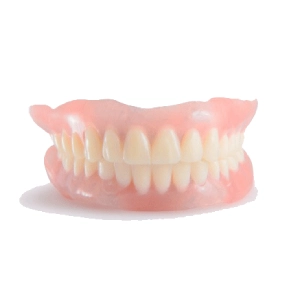
Tips for Effective Denture Whitening:
Always follow the manufacturer's instructions when using denture whitening products to ensure safety and effectiveness.
Avoid using abrasive materials such as harsh toothpaste, bleach, or abrasive brushes, as they can damage the surface of dentures.
Maintain a consistent denture cleaning routine to avoid stains and discoloration from occurring in the first place.
Schedule regular dental check-ups to assess the condition of your dentures and seek professional advice on whitening options.
Whitening dentures can breathe new life into your smile and boost your confidence. By understanding the causes of denture stains and employing effective whitening methods and tips, you can achieve a brighter, more radiant smile. Remember to prioritize regular cleaning and maintenance to prolong the longevity of your dentures and ensure optimal oral health. With the right approach to whitening dentures, you can confidently showcase your beautiful smile for years to come.
Enhance Your Smile Today! Book Your Appointment at Springhill Dental Health Center, Mobile, AL. For new patients, call (251) 265-7808. For existing patients, call (251) 343-1521 to secure your consultation.
It's best to avoid using regular toothpaste on dentures as they can be abrasive and damage the surface. Stick to denture-specific products for safe whitening.
The frequency of whitening depends on factors like your habits and the severity of stains. Follow product instructions and consult your dentist for personalized guidance.
Baking soda paste, vinegar soak, and hydrogen peroxide solution are common home remedies for whitening dentures. However, use them cautiously and consult your dentist for recommendations.
Few things in the world of dental health are as transformative as dentures. They offer a practical solution for restoring both function and confidence in one's smile, whether due to age, injury, or other dental concerns. However, despite their relief, questions linger: Can you eat with dentures? How does it impact your dietary choices and enjoyment of food?
For many people, eating with dentures might seem tricky at first. It means getting used to a new way of chewing and tasting food. But learning to eat with dentures can also open up new possibilities for enjoying meals, even if you need to make some changes.
In this blog, we'll talk about what it's like to eat with dentures. We'll cover the challenges and share helpful tips to make eating easier. Let's explore the question: Can you eat with dentures? You might be surprised by the answer.
Dentures are artificial devices designed to replace lost teeth and their surrounding tissues in the mouth. They serve as a removable solution for individuals who have lost all or some of their natural teeth due to various reasons such as age, dental disease, injury, or other oral health issues. Dentures are custom-made to fit a person's mouth's unique shape and contours and are typically made up of acrylic resin, porcelain, or a combination of materials. They are designed to restore chewing function, improve speech, and enhance the smile's appearance.
Dentures are available in various types, such as full dentures that replace all teeth in the upper or lower jaw and partial dentures used when some natural teeth are still present. It's crucial to care for and maintain dentures properly to preserve their longevity and promote oral health. Taking proper care of dentures is crucial to ensure they last long and promote oral health.
Eating with dentures can pose several challenges, including:
Following are some tips for eating with new dentures: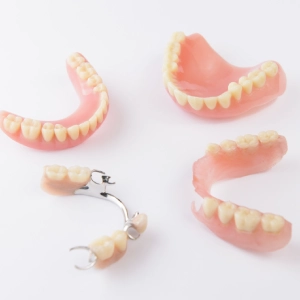
Start by eating soft foods that are easy to chew, like mashed potatoes, yogurt, or scrambled eggs. As you feel more comfortable, slowly add firmer foods back into your diet.
Cut food into smaller, bite-sized pieces to make chewing easier. This reduces the strain on your dentures and makes it more manageable to chew.
Distribute the pressure evenly on both sides of your mouth while chewing to help keep your dentures stable and prevent them from shifting.
Avoid sticky candies, tough meats, and hard nuts, as they can be hard to chew and may loosen your dentures.
Alternate chewing on both sides of your mouth to prevent uneven wear on your dentures and maintain their stability.
Remove your dentures after meals and clean them thoroughly with a denture brush and mild cleanser. Keeping your dentures clean helps prevent irritation and maintains oral hygiene.
Denture adhesives can provide extra stability and help prevent slipping or movement while eating. However, consult your dentist before using them to ensure proper application.
Drink plenty of water during meals to rinse off food particles and keep your mouth moist, which can reduce discomfort from wearing dentures.
Regularly visit your dentist for adjustments and check-ups to ensure that your dentures fit well and feel comfortable.
Following these tips can make the transition to eating with new dentures smoother and more enjoyable.
Transitioning back to your regular diet after getting dentures requires patience and attention. Here are some tips to help make the process smoother:
The question "Can you eat with dentures?" is one that many individuals face as they navigate their dental health journey. While the transition to eating with dentures may present initial challenges, with patience, adaptation, and the right guidance, individuals can enjoy a fulfilling and varied diet.
By understanding the challenges, implementing adaptive strategies, and maintaining good oral hygiene, eating with dentures becomes a manageable and enjoyable experience.
Ready to Eat with Confidence? Schedule Your Appointment at Springhill Dental Health Center, Mobile, AL, Today! For new patients, dial (251) 265-7808. Existing patients can call (251) 343-1521 to secure a consultation.
While dentures allow for a wide range of foods to be enjoyed, it's best to avoid sticky, hard, or tough-to-chew foods that may dislodge or damage dentures.
The adjustment period varies for each individual, but it generally takes several weeks to comfortably adapt to eating with dentures.
Denture adhesives can provide additional stability while eating, but it's essential to consult your dentist for guidance on proper usage and application.
Curious minds often inquire: "Can Dental Implants Cause Neurological Problems?" This question arises from concerns about potential complications associated with dental implant procedures. While dental implants are considered a safe and effective solution for tooth replacement, there is a need to explore the possibility of neurological issues arising from such treatments.
This blog will explore the question, " Can dental implants cause neurological problems?" by examining existing research and shedding light on associated risks.
Dental implants offer a seamless solution that mirrors natural teeth in both appearance and function. These dental implants are surgically inserted into your jawbone to replace extracted tooth roots, making them a cutting-edge option for tooth replacement.
While dental implant procedures generally have a high success rate, it's important to consider issues like the possibility of experiencing nerve pain or other side effects associated with dental implants.
Dental implants have revolutionized dentistry by providing a strong solution for missing teeth, enhancing both resilience and aesthetics.
Despite certain risks associated with dental implant procedures, they typically achieve a success rate of around 98%, depending on placement and the quality of the implant restoration (implant crown).
Dental implants provide several benefits, including:
While many patients experience a smooth recovery after dental implant surgery, it's essential to recognize potential discomforts and complications:
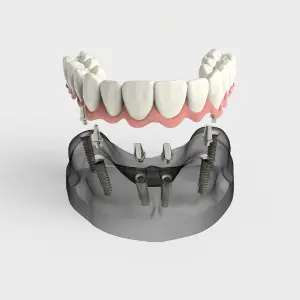
Nerve damage arising from dental implants involves experiencing various degrees of numbness, pain, or tingling sensations in the oral cavity, including the natural teeth, gums, lips, or chin.
This damage usually occurs when dental professionals drill the implant too deeply into the lower jaw, potentially injuring the underlying inferior alveolar nerve. Unfortunately, such injuries are often painful and may lead to permanent damage.
Factors such as local anesthesia, third molar surgery, dental implant placement, and other endodontic treatments can lead to inferior alveolar nerve injury.
This injury is more severe than lingual nerve trauma and requires immediate treatment, possibly including a root canal.
Symptoms of nerve damage include:
Alveolar nerve injury brings about intense pain and reduced sensations in your face, greatly affecting daily activities like speaking, eating, or kissing. This trauma ultimately diminishes your overall quality of life. Moreover, research indicates that inferior alveolar nerve injury might also contribute to mental health issues like depression.
Determining the right timing and exploring the best options tailored to your specific case is crucial in this decision-making process. The success of dental implant surgery lies in personalization and selection of the most suitable choices.
While titanium remains the most common material for dental implants, zirconia may be a preferable alternative under the following circumstances:
If you're worrying about, "Can dental implants cause neurological problems?", it's natural to seek alternatives. However, it's important to note that there is currently no substantial evidence supporting "dental implants cause neurological problems."
For individuals with known sensitivities to metal, zirconia implants offer a promising solution. Many dentists are adept at using zirconia implants, making them a viable alternative.
If you find the concept of zirconia implants more appealing than titanium, it's worth considering. Nonetheless, it's essential to recognize that titanium implants have undergone more extensive research regarding their long-term viability.
"Can Dental Implants Cause Neurological Problems?" explores the potential risks associated with dental implants and neurological issues. While the likelihood is minimal, it's crucial to be aware of the possibility and discuss any concerns with the dental professionals of Springhill Dental Health Center in Springhill Ave, AL. Your oral health is paramount, and proactive communication ensures the best possible outcomes.
Take charge of your oral health today. Book an appointment at Springhill Dental Health Center on Springhill Ave, AL. New callers can dial (251) 265-7808 while existing patients can reach us at (251) 343-1521. Let's prioritize your dental well-being together.
Nerve damage often causes numbness, tingling, or a burning sensation in the gums, lips, chin, or teeth. In severe cases, you may also experience pain or loss of sensation. If you notice these symptoms post-dental implant surgery, consult your dentist or oral surgeon.
Although generally safe, dental implants pose a minimal risk of neurological issues, especially if they affect the jaw nerves. This concern arises more with lower jaw implants, potentially leading to nerve damage. However, advanced imaging and skilled dental surgeons mitigate this risk.
dental implants may cause issues years post-surgery, including peri-implantitis (tissue inflammation), implant loosening, or failure. Regular dental check-ups and good oral hygiene help detect and prevent such complications.
Symptoms of implant rejection include severe pain, inflammation, or swelling around the implant site. Other signs may involve gum recession or implant loosening. Seeking immediate dental advice is crucial if any of these symptoms arise.
Are you wondering, "How Does Diabetes Affect Dental Implant Treatment?" For those who are managing diabetes, it is crucial to understand how the disease affects dental implant treatments. Diabetes can significantly influence the success and outcome of dental implant treatment, presenting unique challenges and considerations.
In this guide, we explore "Does diabetes affect dental implant treatment?" offering insights into the factors, risks, and strategies involved in achieving optimal treatment outcomes.
Dental implants serve as artificial tooth roots, surgically placed into the jawbone and gum tissue. Over several months, they integrate with the mouth's living tissues, mimicking natural tooth roots.
Once integrated, dental implants can support individual crowns, bridges, and partial or full dentures. Their superior strength and stability surpass traditional removable appliances and denture creams.
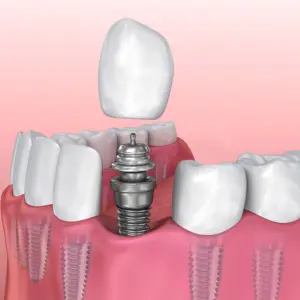
Diabetes often leads to uncontrolled blood sugar levels, disrupting metabolic processes and causing long-term organ damage. Fluctuating glucose levels can hinder wound healing.
Despite these challenges, diabetes shouldn't necessarily prevent dental implant placement. With stable sugar levels and proper precautions, dental implants can be successful for diabetics. In such cases, the implant loss rate is comparable to that in healthy individuals.
To ensure proper healing of the dental implant, it's crucial to reduce glucose levels and maintain long-term stability in sugar levels. Treatment includes maintaining a blood sugar diary, which tracks the patient's condition and care. During the sensitive healing phase, blood sugar levels must be closely monitored and kept stable. This demands careful attention and thorough oversight from both the patient and the practitioner.
Diabetes weakens the body's natural defense against bacterial, viral, and fungal infections due to elevated sugar levels. Inflammation and infections may spread unchecked and heal slowly. In diabetic implantation, maintaining an oral cavity free of germs and strengthening the immune system is crucial. Typically, antibiotics are prescribed before and during treatment to mitigate risks during the healing phase.
Diabetes disrupts calcium absorption and the generation of bone-forming cells. Vitamin D is necessary to transport calcium into the bloodstream, but its production is also affected by diabetes. Consequently, bone production essential for dental implant healing is hindered, increasing the risk of implant loss.
Classic restorations like bridges, crowns, or dentures offer an alternative to dental implants. However, they may not match the aesthetics or functionality of implants and can pose risks to neighboring teeth. Despite these considerations, dental implants remain a favorable option for individuals with diabetes.
After implantation, particularly with diabetes, meticulous oral hygiene is crucial to prevent inflammation. Patients must maintain regular professional cleanings and frequent check-ups to ensure the longevity of their dental implants.
Many diabetes-friendly diets emphasize foods requiring thorough chewing, like fresh fruits, vegetables, and nuts. Dentures may hinder chewing such foods, leading to the consumption of softer, processed options that can spike blood sugar levels. Dental implants restore much of the chewing function of natural teeth, facilitating a balanced diet.
Curious if dental implants suit your needs? Reach out to your implant dentist today to explore this innovative tooth replacement solution further!
Several strategies are employed to boost the success of dental implants in individuals with diabetes:
Individuals with diabetes often face a higher infection risk compared to non-diabetics due to the condition's impact on the body's infection-fighting abilities. This heightened risk extends to gum disease and potential infections following surgical procedures, including those related to dental implant placement.
Different Dental Implant Procedures for Individuals with Diabetes:
Dental implant treatment remains a viable option for individuals with well-controlled diabetes, boasting success rates comparable to those of healthy individuals. However, it's crucial for patients to maintain optimal blood sugar levels to remove the risk of implant failure. By staying vigilant about their diabetes management, patients can ensure the success and longevity of their dental implants, enabling them to enjoy restored oral health and functionality.
Are you concerned about does diabetes affect dental implant treatment? Look no further than Springhill Dental Health Center on Springhill Ave, AL, for expert guidance. Book an appointment today to discuss your options and ensure the best possible outcome. New patients can call at (251) 265-7808, while all other callers can reach us at (251) 343-1521. Your journey to a healthier smile begins here!
Despite diabetes challenges, individuals with type 1 or type 2 diabetes can typically receive dental implants if they manage their condition effectively.
The implant survival rates in diabetic patients range from 88.8% to 97.3% one year after the placement and 85.6% to 94.6% in functional terms post-prosthesis insertion.
If a dentist or dental implant specialist determines that the jaw bone lacks sufficient density or strength to support the implant securely, they may say the patient is unsuitable.